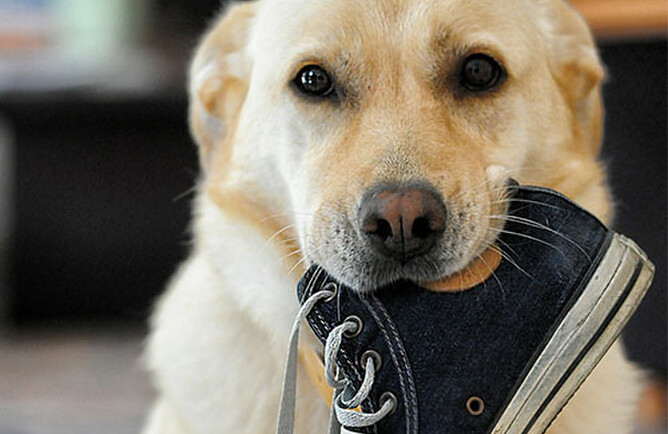Understanding and solving the dog chewing problem
Coming home to find remnants of your favourite slippers scattered throughout the house is a tragic scene all dog-owners have experienced.
Sometimes a teething puppy just doesn’t understand what not to chew, but this habit can become more of a problem as they get older (with stronger jaws and a taste for table legs!).
We explain the reasons why dogs wreak havoc with our stuff, and how to outtrain this destructive behaviour. It’s easier than you think!
It’s not always naughty!
Chewing is actually a beneficial behaviour for dogs, keeping their teeth clean and providing hours of entertainment.
Puppies need to chew to explore their surroundings, and to comfort the painful teething stage. Replacing ‘bad’ chewing with ‘good’ chewing makes sure your dog can enjoy this healthy habit without risking your belongings.
It’s often as simple as making sure there are more desirable alternatives available to your puppy – so they don’t choose the TV remote!
Dog chewing is also a sign of anxiety and stress. Destroying Mum or Dad’s best shoes is sometimes your dog’s way of saying ‘I want more exercise and cuddles because protecting you is very stressful!’.
When they are left alone for long periods of time without stimulation, or exposed to stressful environments, your pup may resort to destroying things out of frustration.
But with so little time and so much stuff in our house, is it possible to stop a dog from chewing fast? Yes!
The causes…
The key reasons for chewing can be broken down into four categories: health, age, training, and stress.
Before you start training to stop your dog chewing, think about what is making him destroy things in the first place:
- Health issues: Always rule out a medical problem with your local vet; parasites and tummy problems can lead to chewing out of pain or frustration.
- Teething: If your puppy is under six months of age he is likely teething – this is still a great opportunity for him to learn!
- Poor training: Your adult dog might not have been trained properly, he has grown up thinking everything is a toy! He needs to be retrained.
- Stress overload: Your dog is actually struggling with stress, anxiety, or boredom. These issues can be complex and require further instruction from a vet, but often exercise and affection is key!
The solutions…
1. Provide alternatives to redirect your dog
Encouraging your pup to chew on toys is great for their well-being and keeps them content without eyeing up your belongings!
Great chew toys don’t have to be fancy, but should be strong and interesting. Pop in-store to check out our huge range of toys suitable for all ages and breeds!
If you catch your dog chewing, try to immediately say “No!” and redirect them to their toy. Always reward them for choosing to chew their own toys, this builds a positive association.
This works a lot better than just scolding your dog when you arrive home and discover the day’s crime scene! Instantly correct a bad behaviour by replacing it with a good one.
2. Dog-proof your home
Sometimes that item shouldn’t have been left there in the first place! Encourage your family to always keep precious belongings tidied away and out of your dog’s reach. It’s really a bonus as you’ll also reduce clutter!
Scan your surroundings for anything a curious puppy or cheeky dog can grab, and do this regularly when you enter or leave a room. Installing child-gates are a helpful way of keeping your dog out of tempting rooms, such as children’s play areas that are bound to get messy.
Another option is crating, which can be used as a discipline tool. When you catch your pup getting into things they shouldn’t just put them into the crate for five minutes, before letting them out and providing a chew-toy. Gradually, your pooch will recognise that chewing Dad’s socks means time-out!
We need to remember to take responsibility, too! Having a dog is just like having a new baby or toddler – everyone needs to make sure tempting (and dangerous) items are well out of a curious pup’s reach.
3. Extra exercise!
Boredom and frustration from lack of exercise and stimulation will make your dog want to chew and destroy things. Your dog looks to you and your family for entertainment, so ensure they get plenty of attention when you are home – and things to play with when you are not!
Experts interpret dog chewing as a coping mechanism for the stressful job of guarding you and your family – your dog sees themself as your protector. Allowing your dog extra playtime and affection signals that they can relax.
Try to see inappropriate chewing as a sign that your pup needs some attention from you: take them for a walk, play a game of fetch or tug-of war with an appropriate toy, or just spend some quality time with them.
A well-exercised dog is a happy dog. Always make sure your furry friend is getting plenty of exercise and playtime every day for their physical health, but just as importantly, for their emotional wellbeing. You’re bound to see their mood and behaviour improve!
Remember, dogs have habits, just like us
Like our dogs, people develop compulsive or destructive habits that are caused by many problems. Nail-biting from anxiety and moodiness from being lethargic are common issues that can be improved when we spend time with loved ones and spend time outdoors exercising. So we’re not that different!
Try to remember this next time you catch your beloved canine ripping yet another cushion!
Want to treat your pup to some fun and interesting chew toys? We have a range of toys available for dogs of all ages and sizes. Give us a call on 09 488 2227, or pop into our store to speak to a Nose to Tail professional!


